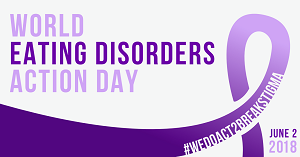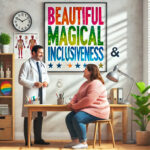The cost of hiding an eating disorder and pretending you are okay
The cost of hiding an eating disorder and pretending you are okay

by June Alexander
Many people who have an eating disorder are terrified of others close to them knowing about it. I refer to people who are able to function – that is, go through the motions of attending school or college, going to work, being a parent. Many of us who have an eating disorder pretend, to our outside world at least, that we are okay. Shame and stigma is rife. The cost is terribly high on our health and happiness, our relationships and our community. This has to stop.
Living in fear
For decades I kept my eating disorder a secret. I presented as a capable professional career woman. I was mother of four and worked full-time in a newspaper office. My colleagues and friends knew nothing about my illness. Living in fear that it might be discovered, I worked harder than most and became vulnerable to exploitation. I felt that I must be weak-minded, not able to cope like others – to be like “normal people.” I envied anyone who could eat lunch and not feel guilty about it! I will never forget the awfulness of wanting to be like others, to belong, to be carefree. Instead of being caught in a vicious cycle with the eating disorder, not knowing which way was out.
To disclose or not to disclose
Welcome discussion is taking place regarding the decision to disclose or not to disclose one’s eating disorder history in the work place – including among health professionals who have had, or continue to have, an eating disorder – similar to the gay movement.
Which is worse – hiding in the closet in fear and pretending you are someone you are not, or risking being true and open to all? For me, the bottom line is that while we hide in the closet, the eating disorder has the upper hand. This illness thrives on secrecy and darkness. We need to bring it out into the light, and keep it in the light. For me, the benefits far outweigh any negatives because to beat the eating disorder, one secret is one too many.
This discussion reminds me of my youngest son, who developed Juvenile Diabetes age 11, at the same age I developed Anorexia. He is in his early 40’s now, injects insulin daily, and has a successful career. In his early professional life, he learned not to disclose his illness because he did not want to be considered “different” or to be treated as “a victim;” he wanted to be considered “normal,” and to be judged on his merits and skills. That is, he did not want to be defined by his illness in the workplace.
The cost of keeping quiet
In regard to “going public” with my eating disorder, I waited many years, until I was 55 and feeling fully recovered and strong within my sense of self, before sharing my story publicly. Throughout my journalism career of more than three decades I did not disclose my illness to employers, because I, like my son, wanted to be considered “normal,” even if it meant I was functioning on about five per cent of my brain at times.
In addition, I feared discrimination and rejection for disclosing a mental illness. I had good reason for considering that judgment for “being different” was a strong likelihood. I feared I would lose my job and therefore my livelihood, and would have no hope of advancement in my career. It was a recipe for disaster. For instance, I persevered at work when my illness was raging, due to fear of asking for sick leave, and so my illness worsened until the point where I collapsed and needed months in hospital.
The eating disorder loves secrecy
The difference between an eating disorder and other illnesses is that a person with an eating disorder continues to attract suggestive put-downs based on ignorance and misunderstandings. There are insinuations of weakness, that you-cannot-be-relied-upon and cannot be trusted; moreover, you are neurotic . Sadly, the cost of trying to hide the illness, and keep it hidden, is that the illness is not dealt with fully, and it maintains permanent residence in the brain as tormentor supreme. While this goes on, you are denied good health, contentment and freedom-to-be-your-true-self.
To remove the stigma that causes many people to suffer silently, I believe we need more people who have recovered from their eating disorder to stand up and show this illness and the community at large that we are able to recover and live full and rewarding lives.
As with other serious illnesses, we may lapse now and then. This is part of life. People with an eating disorder have done nothing wrong! Our experience makes us more reliable, dependable, resilient, empathetic than most. The thing is, to be recognized first and foremost for who we are — as a professional employee, as a student, as a parent, as a partner, as a child, as a sibling, as a friend; that we have had or have the illness, is secondary.
“And by the way, I have had an eating disorder”
To confront the stigma/rejection/misconceptions in our communities, society and health care systems, I believe we need professionals to stand up, as some already do, and say “I have all these qualifications and have worked hard on my career, and by the way, I have had an eating disorder.”
There are ethical concerns of course, and responsibility and self-care is vital – one needs to be able to say “I need time out to care for myself right now,” when lapse symptoms first appear. It is far better to take action early and nip a lapse in the bud, than to try ignoring the symptoms because we are afraid of what our family, friends or peers might say, and then succumb to a full-blown relapse. It is okay to take action early with other illnesses, without feeling shame or stigma; it needs to be okay for people with eating disorders, too.
Openness is essential
By seeking help from appropriate specialist healthcare services for your eating disorder, you can have a full and rewarding career, be a wonderful parent, be whoever you want to be. This is a message we need to get out.
Recovery from an eating disorder requires a lot of courage from self; and for best results, to maintain recovery, it requires ongoing openness and acceptance in a village of people who understand and who care. Surround yourself with people who understand and support you. Ignore those who don’t provide the support you need.
Share your story
We hear a lot of stories about people who are suffering the illness, anorexia in particular (because it is the most graphic for media). To counter this we need a lot more stories from people who have recovered from not only anorexia, but also bulimia and binge eating disorder. Stories of personal healing are able to offer encouragement, empathy and support to people who are struggling today in a way that those without experience of the illness may never know.
We need to “normalize” eating disorders so the illness can be acknowledged openly and kept in the light. This is the best way to reduce the impact, stigma, fear, loneliness, isolation and incidence of the illness itself.
- This article is drawn from my blog: http://www.junealexander.com/2014/05/the-cost-of-hiding-an-eating-disorder-pretending-you-are-okay/#sthash.ppyMhbVC.dpuf
- For more about my work, see https://lifestoriesdiary.com

Take part in World Eating Disorders Action Day
World Eating Disorders Action Day on June 2, 2018 is a grassroots movement designed for and by people affected by an eating disorder, their families, and the medical and health professionals who support them. Uniting activists across the globe, the aim is to expand global awareness of eating disorders as genetically linked, treatable illnesses that can affect anyone. The Third Annual #WorldEatingDisordersDay will take place on June 2, 2018 with a focus on breaking stigma about Eating Disorders. #WeDoAct2BreakStigma.
Join the virtual campaign on social media and host a local event to share information and advocate for policy change to ensure access to evidence based treatment for all affected.





